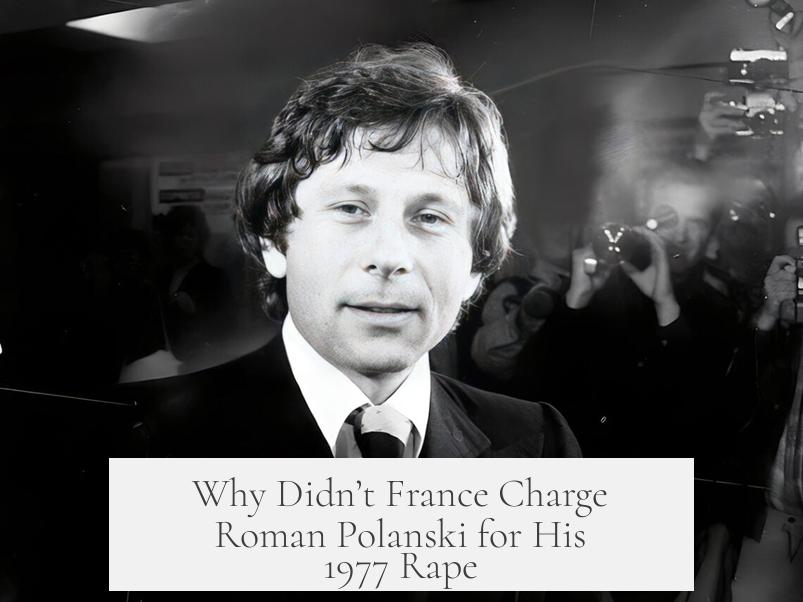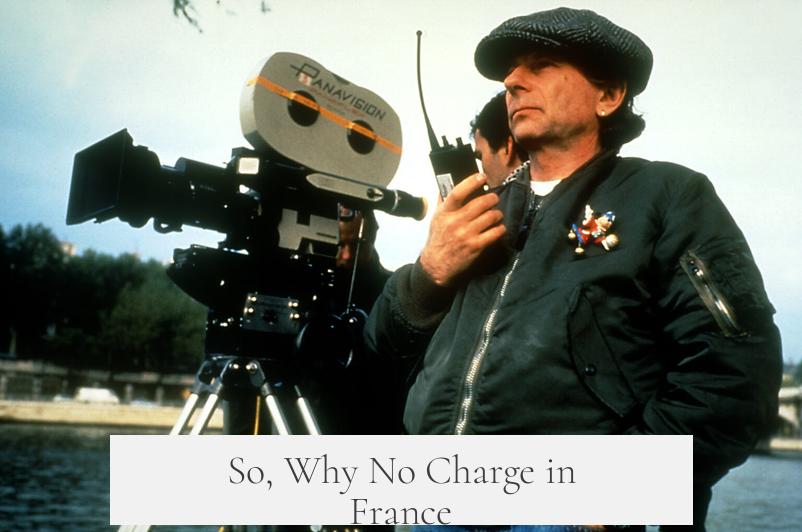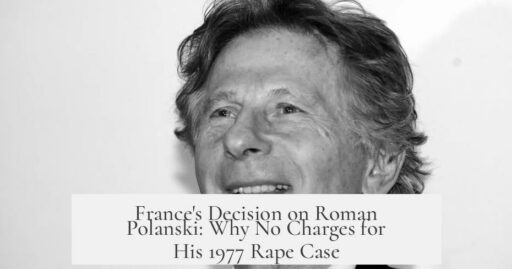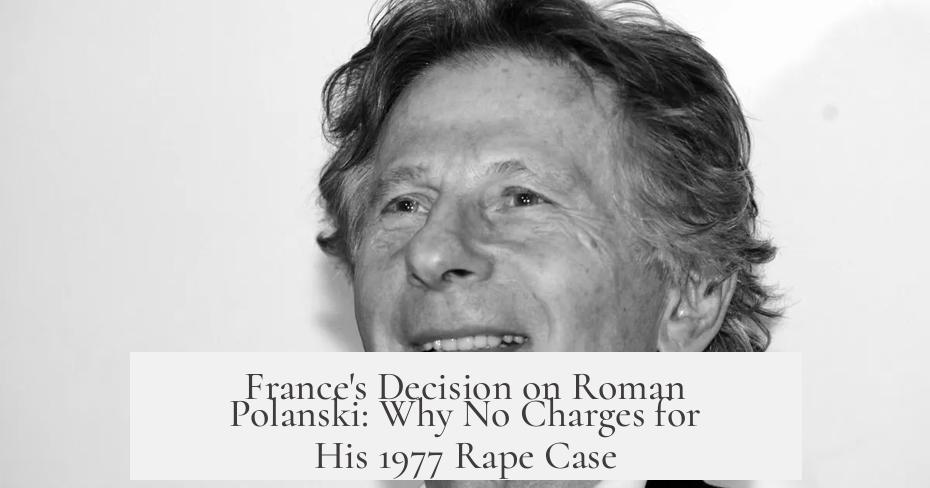France did not charge Roman Polanski for his 1977 rape because of a legal and diplomatic impasse involving jurisdiction, extradition policies, and the refusal of U.S. authorities to share the complete case files.
Roman Polanski faced multiple criminal charges in California in 1977. These charges included furnishing a controlled substance to a minor, lewd or lascivious acts upon a child under 14, rape by use of drugs, oral copulation, and sodomy. The victim was a 13-year-old girl. Polanski’s legal team negotiated a plea deal where he pled guilty only to the lesser charge of unlawful sexual intercourse with a minor. After a 90-day jail stay allowance to complete a project, he served just 42 days in prison. A psychiatric evaluation recommended no additional jail time.
Before sentencing could be finalized, rumors emerged that Polanski would face incarceration for the remainder of the 90 days followed by deportation. Fearing this outcome, he fled the United States in early 1978, initially to London and then to France.
French authorities expressed willingness to prosecute Polanski domestically but only if the U.S. transferred the full case file. The U.S. government, however, insisted on maintaining jurisdiction and refused to provide the entire documentation, preferring to extradite Polanski. France, by law and policy, never extradites its own citizens, including Polanski, who holds French citizenship.
| Factor | U.S. Position | French Position |
|---|---|---|
| Jurisdiction | Preferred to prosecute Polanski in the U.S. | Willing to prosecute only with full case files from U.S. |
| Extradition | Requested Polanski’s extradition | Refused extradition of its citizen |
| File Sharing | Did not provide full case documentation | Required full case access before prosecution |
This divergence created a stalemate. French courts could not proceed without the necessary legal documents. The U.S. could not prosecute without Polanski in custody, and France would not extradite him. Thus, the case remains unresolved in France due to jurisdictional and diplomatic barriers.
In 2009, Swiss authorities arrested Polanski during his visit for a film festival award. His defense argued the original sentence had been served effectively, which prevented extradition to the U.S. This development echoed the earlier patterns of legal gridlock surrounding his case.
The original sentence of 42 days jail and subsequent probation was considered unusually lenient. Los Angeles District Attorneys have noted that such a sentence could not be imposed under current laws.
- Polanski pled guilty to unlawful sexual intercourse with a minor in 1977.
- He fled the U.S. before sentencing due to fears of extended jail time and deportation.
- France demanded full U.S. case files to prosecute; the U.S. refused.
- France won’t extradite its citizens, creating a legal impasse.
- The lack of prosecution in France results from this diplomatic stalemate, not legal leniency.
Why Didn’t France Charge Roman Polanski for His 1977 Rape?

To answer the burning question right away: France never charged Roman Polanski for his 1977 rape because of a bureaucratic deadlock and conflicting legal procedures between the United States and France. France was willing to prosecute but only if the U.S. handed over the entire case file, which never happened. Meanwhile, France’s strict policy against extraditing its own citizens further complicated matters.
Let’s unpack this tangled saga. The Polanski case is one sticky legal spaghetti bowl, twisting through cross-continental rules and a famously controversial figure in film.
The U.S. Legal Saga: Charges and Flight
Back in 1977, Roman Polanski faced some serious accusations in the state of California. The indictment covered a broad slate of charges: furnishing a controlled substance to a minor (champagne and methaqualone to a 13-year-old), lewd acts on a child under 14, unlawful sexual intercourse, rape through drugs, oral copulation, and sodomy. That’s quite the list.
But here’s where it gets interesting. Polanski’s legal team negotiated a plea bargain. He pleaded guilty to just one count—unlawful sexual intercourse with a minor. The rest got dropped faster than a hot potato. Polanski agreed to a 90-day psychiatric evaluation stay at the state prison after finishing a film project. Yet, he served only 42 days before release.
The psychiatric report? It showed trauma in his past but recommended no further jail time.
Sounds straightforward, right? Not quite. Rumors swirled that Polanski might face incarceration beyond the 90 days followed by deportation. Sensing the writing on the wall, he skipped town—first London in early 1978, then his native France.
France’s Stand: Cooperation, Not Extradition
France didn’t say “No” to prosecuting Polanski. In fact, French authorities expressed willingness—but with a catch. They insisted on obtaining the entire U.S. case file first. In simple terms, “Show us the evidence, please.”
The U.S. declined. They wanted to keep control of prosecution or extradite Polanski back to the States. But here comes the French twist: France does not extradite its own citizens. It’s a policy firmly written and rarely bent. So, France’s hands were tied when it came to handing Polanski over.
What begins as a negotiation quickly turned into an impasse. U.S. wants Polanski tried on home turf; French law says, “We want the file, but we won’t send him back.”
Later Attempts and Legal Arguments
Fast forward to 2009. A brief glimmer of hope to resolve the issue flickered when Polanski was arrested in Switzerland before attending the Zurich Film Festival.
The Swiss considered extradition to the U.S. But Polanski’s lawyer argued a neat defense: that the crime didn’t qualify for extradition because he had “effectively served his sentence.” The Swiss bought it. The extradition request never advanced further.
So, Why No Charge in France?

The French willingness to prosecute was hamstringed by U.S. refusal to supply the complete files. This bureaucratic stalemate was the key hurdle—not leniency or legal incapacity on France’s part. If the Americans had cooperated, France could have exercised its judicial power to try Polanski.
It’s a reminder that international justice can get caught up in paperwork and sovereignty politics.
A Quick Look at Sentencing: Then vs. Now
The LA District Attorney once described Polanski’s original sentence as “very, very, very lenient” — something you probably wouldn’t see today under any new law. Polanski served just 42 days, a stark contrast to how such crimes might be punished in our current justice system.
The case’s handling back then plays a big role in why the French decided not to press charges independently—it was wrapped up in a plea deal and a partial sentence. That doesn’t erase the controversy but adds layers to why the French response looks the way it does.
What Can We Learn?
Polanski’s saga underscores how international cases involving serious crimes can spiral into tangled jurisdictional disputes. It’s not always about who’s guilty or innocent but often about which legal systems assert their power and how diplomacy plays out behind closed doors.
More than 40 years later, the echoes of this case continue to resonate. France’s refusal to extradite creates a safe harbor for citizens, but it also raises questions about accountability on a global stage. How do countries balance protecting their citizens with serving justice internationally?
What if the U.S. had shared the full case files? Would France have prosecuted differently? These remain unanswered but crucial questions.
Finally, Polanski’s case asks us: should international law evolve to better handle such jurisdictional gaps? Or will political interests always muddy the waters, especially when a famous person is involved?
In the end, France’s decision not to charge Roman Polanski for the 1977 rape wasn’t a matter of legal inability or moral blindness. It was a *legal stalemate* fueled by conflicting policies, a desire for control over the case file, and a standing refusal to extradite French nationals. A bureaucratic tug-of-war with profound consequences.




